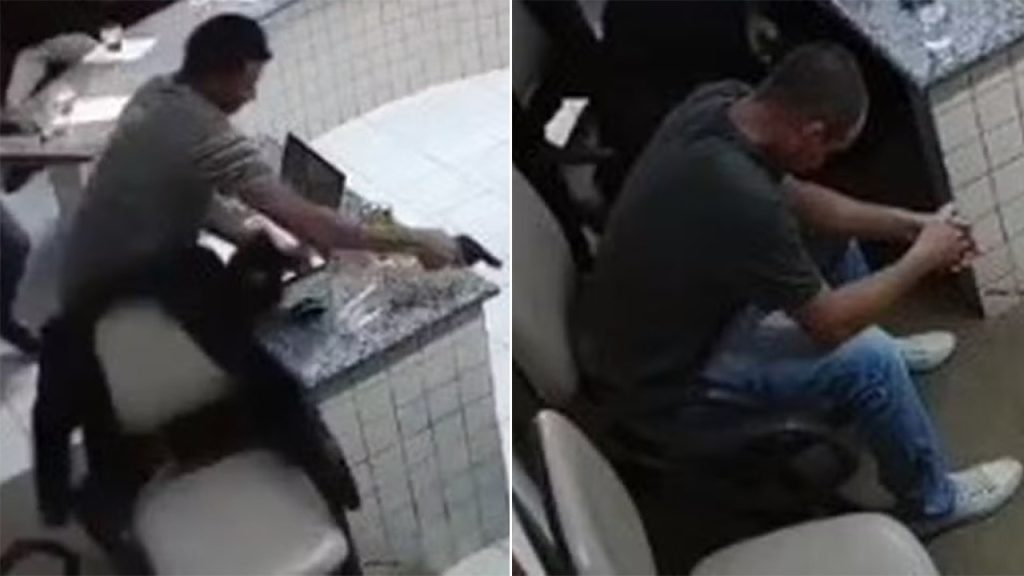A man attending the murder trial for his father’s killer in Brazil interrupted court proceedings to shoot the suspect half a dozen times and assault him. The incident took place in São José do Belmonte, where Cristiano Alves Terto, 27, opened fire at Franscico Cleidivaldo Mariano de Moura, 38. The attack was captured on CCTV, showing judges and jury members scattering for cover. It remains unclear how Terto was able to enter the courtroom with a .38-caliber revolver. The attack occurred on November 29, 2023, and the video was released by police on April 1, 2024. Terto chased Moura across the courtroom, striking him in the head before being apprehended by police on suspicion of attempted murder.
Moura, the defendant, had killed Francisco Alves on October 5, 2012. In his confession, Moura claimed that he had encountered Alves while looking for a lost donkey. Alves allegedly treated him with hostility, calling him a “filthy little thief” and demanding he leave. When Alves approached him with a wooden stick, Moura fired warning shots into the air and ground before ultimately shooting Alves in self-defense. Alves suffered a single gunshot wound to his abdomen, leading to his death after 18 days in the hospital. Moura fled to Salguiero, where he remained at large for over a decade before being found and arrested by police.
Following the attack in court, Moura survived the shooting but had to be taken to a local hospital for treatment before being transferred to a larger facility. He has since been discharged. Despite the incident, no retrial date has been set for Moura. Terto, the attacker, has been detained since the day after the incident. The Pernambuco Court of Justice stated that the jury has not reconvened, and a new trial date has not yet been scheduled. The violent outburst in court has left both Terto and Moura in legal limbo, with further proceedings on hold.
The courtroom attack in Brazil is a shocking and violent incident that highlights the deep emotions and tensions that can arise during criminal proceedings. The video footage of Terto shooting and assaulting Moura as judges and jury members flee for safety is a harrowing reminder of the potential for violence in court settings. The aftermath of the attack, with Moura surviving and being discharged from the hospital, has left both men in legal uncertainty as they await further developments in their respective cases. The tragic history between the two men, with Moura being the convicted killer of Terto’s father, adds a layer of complexity to the situation and underscores the consequences of violence and revenge.
The case of Francisco Alves’s death at the hands of Moura in 2012 has had lasting repercussions, leading to the courtroom attack and subsequent legal proceedings. The details of the encounter between Alves and Moura, as recounted by Moura in his confession, paint a picture of a volatile and deadly confrontation that ultimately ended in tragedy. Alves’s death and Moura’s subsequent flight from justice only served to escalate tensions between the parties involved, culminating in the violent outburst in court. The delay in setting a retrial date for Moura and the continued incarceration of Terto underscore the challenges of seeking justice and resolution in cases marked by violence and vengeance.
The legal system in Brazil faces significant challenges in resolving cases like that of Alves’s murder and the subsequent courtroom attack. The failure to prevent Terto from bringing a firearm into the courtroom raises questions about security protocols and the ability of authorities to maintain order and safety during legal proceedings. The emotional impact of violent crimes and the desire for retribution manifested in the actions of Terto highlight the complexities that legal professionals and law enforcement officials must navigate in seeking justice and maintaining peace. The fallout from the attack, with both men now awaiting the next steps in their respective cases, serves as a sobering reminder of the lasting consequences of violence and the importance of upholding the rule of law in the pursuit of justice.


